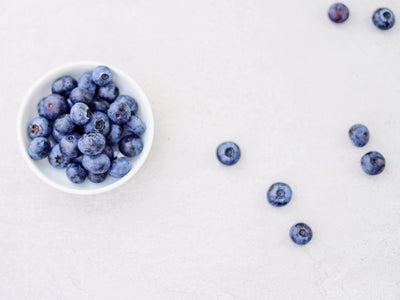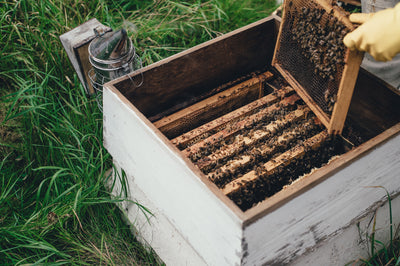Optimising your Pet's Wellness with Holistic Herbs

Just like humans, animals experience health complications and illness
The use of supplements and herbs for pets is a growing trend, as more pet owners seek natural and holistic approaches to their pet's health and well-being. The popularity of these products is likely to continue to increase, especially as awareness of their potential benefits spreads. [8]
Building on the conversation we started in our previous article “Why Pets Enhance our Wellbeing… and 6 ways to become a more conscious pet carer”, let’s explore holistic healthcare and herbalism for our furry friends.
Did you know that animals have been using plants and herbs to self-medicate since the beginning of time?
This process is called zoopharmacognosy. [14]
According to Holistic Vet, Dr. Doug Knueven [13] “It has been proposed that the human use of herbs may have started by early man (and woman) carefully watching and mimicking wild animals. If we have animals to thank for our practice of herbalism, then I think it is high time for us to return the favour and treat our pets with gentle herbs in place of harsh drugs.”
25% of all pharmaceuticals derive from herbs which makes them an ideal substitute for treating ailments [13]. Research has shown that the top 5 categories of supplements needed for pets include [13]:
- Digestive & Joint
- Skin & Coat
- Immune Support
- Brain Health
- Nervous System Support
A good perspective of herbal remedies that will help you on this journey is mentioned in the book "Herbs for Pets".
“…to use herbs to their best potential, we must take on a holistic perspective of health and healing that views all components of mind, body, spirit and environment as equal parts of an individual's well being. At the core of this whole body perspective is a good diet."
By choosing food (or preparing food yourself) that is designed holistically for your pet, you can prevent health problems before they arise. Then if needed, supplementing their diet with certain herbs approved by their veterinarian, you can help your pet to have a longer and happier life!
Digestive & Joint

1. Ginger:
In Ayurveda this root is used to improve digestion, reduce nausea and soothe digestive discomfort in pets. [10]
2. Glucosamine:
In western herbalism, glucosamine is a naturally occurring compound that helps support joint health and reduce pain and inflammation in pets. [6]
3. Liquorice Root:
According to the book “Herbs for Pets”, liquorice is used as an "anti-inflammatory steroidal and non-steroidal medicine.” [2]
It is also used to soothe the digestive tract, reduce inflammation and improve digestive functions in pets.
4. Wormwood
Also known as Artemisia absinthium, Wormwood has an important role to play insofar as it acts as a tonic for the stomach and gallbladder and helps to stimulate the secretion of bile.
In western herbalism, this is a good herb for natural deworming.
Skin & Coat

1. Omega-3 Fatty Acids:
Found in fish oil, flaxseed oil, and chia seeds, Omega-3 fatty acids help to improve skin and coat health by reducing inflammation and promoting healthy skin cell growth. [12]
2. Dandelion (Root & Flower)
In western herbalism, this herb and common weed is used to improve liver function and detoxify the body, leading to healthier skin and shinier coats in pets. It is also known to have broad spectrum minerals like potassium, vitamins and proteins. [2]
3. Nettle:
Rich in vitamins and minerals, nettle is used to improve skin and coat health by reducing itching and promoting healthy hair growth in pets. It is one of those “herbs that lend rich nutritional value”, especially good for anaemia and mineral deficiencies. [3]
Immune Support

1. Echinacea (Root & Flower):
According to the "Natural Health Bible for Dogs & Cats" [2], Echinacea is commonly known for its use as an immune stimulant, an antimicrobial, antiviral and antibacterial. It is used for allergies, rheumatoid arthritis, cancer, infections, kidney disease and urinary disorders.
2. Milk Thistle:
In western herbalism, this herb is commonly used to support liver function and overall health, including the immune system in pets. “Typically used in dogs with liver disease, milk thistle aids with cellular repair and regeneration and detoxification.” [5]
Brain Health

1. Ginkgo Biloba:
Commonly used in Chinese Medicine to improve blood flow and oxygenation to the brain, enhance memory and reduce cognitive decline in pets. [5]
2. Turmeric:
Contains curcumin which has antioxidant and anti-inflammatory properties, helping to protect the brain and improve cognitive function in pets (while also aiding joint and muscular health). [10]
3. Ashwagandha:
Used in Ayurveda to reduce stress, anxiety and promote overall brain health in pets. “Studies suggest it can decrease neurodegeneration, inflammation, adrenal stress, and anxiety.” [5]
Nervous System Support

Compared to humans (who have approx 6 million), cats and dogs have approximately 600 million smell receptors. These receptors can activate the senses on a physical, mental and emotional level, therefore the smell of plants, herbs & their oils can affect the olfactory system and have a beneficial effect on animals' mood, emotions and health.
1. Valerian Root
According to “Herbs for Pets”, valerian root can be used as an antibiotic for eyes, ears and mucous membranes. It is also commonly used for pets with acute anxiety, hyperactivity and to help relieve seizures and pain. [1]
2. Lavender:
In western herbalism, lavender is known for its calming properties and can be used to reduce anxiety and promote relaxation for pets. [5] “Aromatherapy involves using essential oils which must be used carefully as dogs and cats are extremely sensitive. While many oils can be toxic to cats, lavender is thought to be safe.
3. Passionflower:
Passionflower is commonly used to elevate a relaxing mood, for fear, post-traumatic depression and as an alternative option for animals that do not respond well to valerian. It is also used to treat anxiety, nervousness and restlessness in pets. [1] Passionflower is ideal for rescued animals that suffer from PTSD.
Disclaimer:
Please keep in mind that not all supplements and herbs are safe or effective for all pets. Always consult with a holistic veterinarian before giving any supplements or herbs to your pet, and follow their dosing recommendations closely. Also please be aware that the safety of herbs can differ greatly depending both on the type of herb and the type of pet. Always refer to your holistic vet!
References
[1] https://link.springer.com/article/10.1186/s13750-021-00252-w
[2] Herbs for Pets - The Natural Way to Enhance Your Pets Life by Gregory L. Tillford and Mary L Wolf : https://books.google.com/books?id=oe8KBgAAQBAJ
[3] Natural Health Bible for Dogs and Cats by Shawn Messonnier: https://www.google.com/books/edition/Natural_Health_Bible_for_Dogs_Cats/wdK5ajezQ4EC?hl=en&gbpv=1
[4] https://yourolddog.com/herbs-for-dogs-an-introduction/
[5] https://www.liebertpub.com/doi/abs/10.1089/107628003322658593?journalCode=act
[6] https://www.veterinarypracticenews.com/seniors-december-2021/
[7] https://www.veterinarypracticenews.com/how-going-green-impacts-veterinarians/
[10] https://www.onlynaturalpet.com/blogs/holistic-healthcare-library/using-herbs-for-pet-health
[11] https://www.onlynaturalpet.com/blogs/holistic-healthcare-library/homeopathy-for-pet-health
[12] https://www.onlynaturalpet.com/blogs/holistic-healthcare-library/the-top-6-supplements-for-dogs
[13] https://drdougknueven.com/herbal-pet-the-basics/
[14] https://www.ncbi.nlm.nih.gov/pmc/articles/PMC4267359/




































